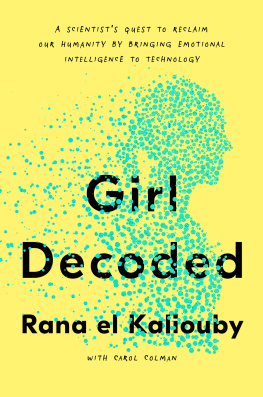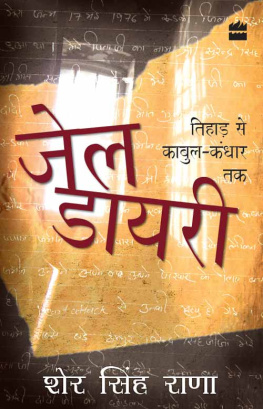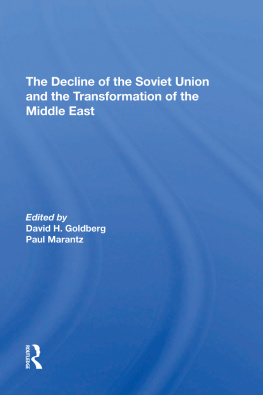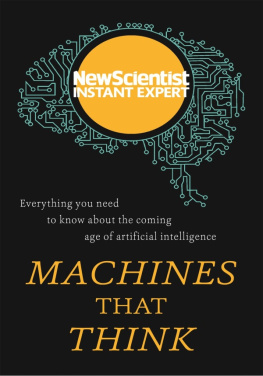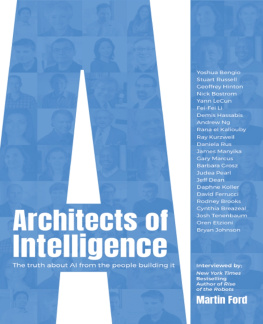Contents
Landmarks
Print Page List
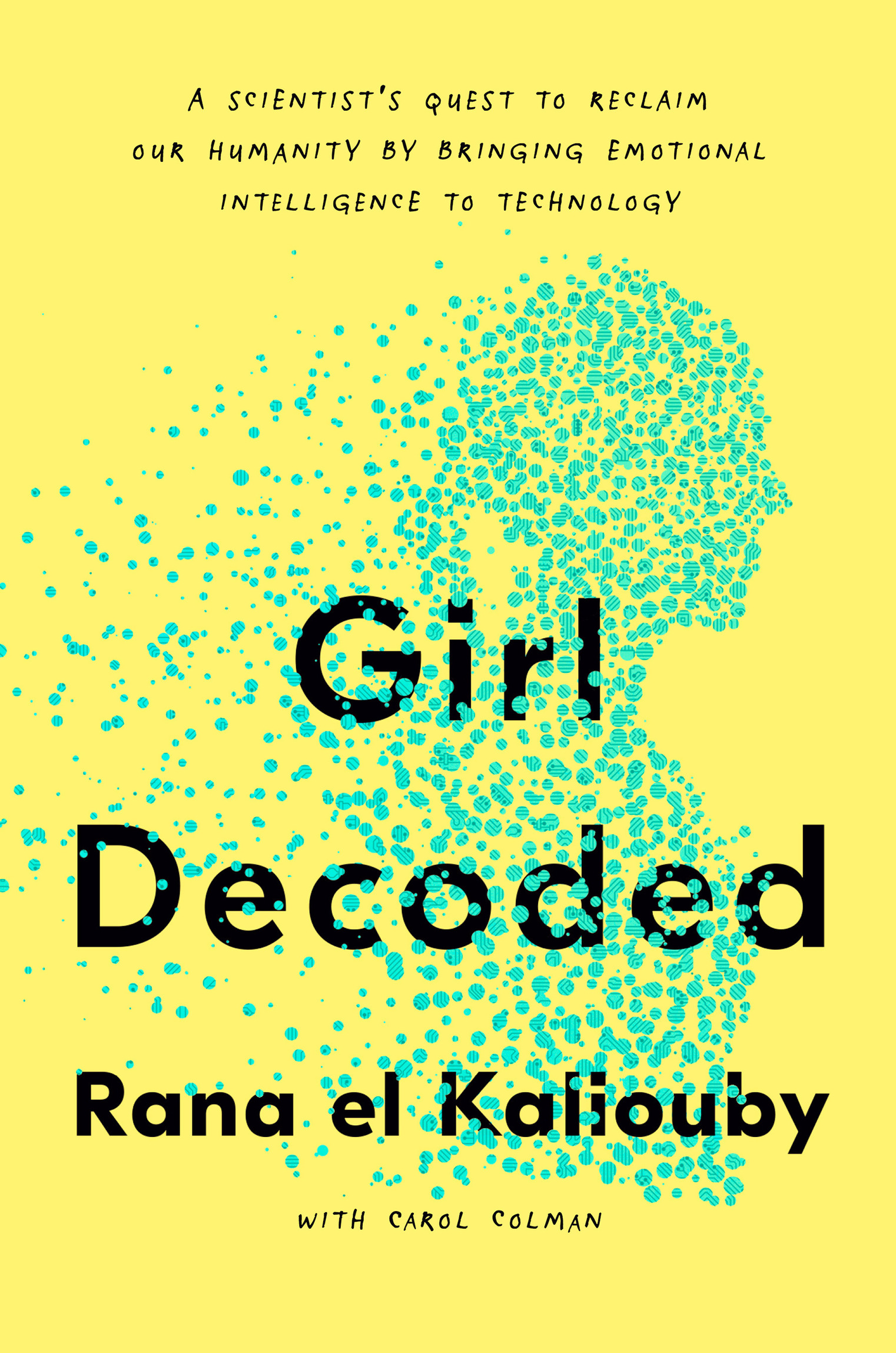
Praise for GIRL DECODED
Artificial intelligence is advancing exponentially. Creating a hopeful, compelling, and abundant future for humanity depends on the work outlined by entrepreneur Rana el Kaliouby in her must-read book, Girl Decoded. It is critical that we embrace a future in which technology enhances our most human qualities, specifically empathy, caring, and emotional intelligence.
PETER DIAMANDIS , founder and chairman of the XPRIZE Foundation and coauthor of The Future Is Faster Than You Think
Emotional intelligence in AI is every bit as critical for machines as it is for humans. No one has done more to create that capability than Rana el Kaliouby. This book tells the remarkable story of her pioneering journey, breaking barriers all along the way. A must-read!
ERIK BRYNJOLFSSON , professor at MIT Sloan School of Management and coauthor of The Second Machine Age and Machine, Platform, Crowd
Written with kindness, vulnerability, and grace, Girl Decoded reveals the tour de force that is Rana el Kaliouby. Her must-read memoir spurs technologists to follow their conscience and emboldens women all over the globe to fight for their dreams.
DR. KATE DARLING , leading expert in robot ethics and research specialist at the MIT Media Lab
This lucid and captivating book by a renowned pioneer of emotion-AI tackles one of the most pressing issues of our time: How can we ensure a future where this technology empowers rather than surveils and manipulates us?
MAX TEGMARK , professor of physics at Massachusetts Institute of Technology and author of Life 3.0
Rana el Kaliouby is one of the most brilliant and inspiring people Ive ever met, but I wasnt prepared for how this book would move me. The reader joins Rana on an uplifting journey from nice, shy Egyptian girl to scientist, entrepreneur, and visionary American leader. We also witness the birth of an ideathat machines can be trained to recognize and respond to human emotion. Rana expresses her vision with clarity and hope, and leaves us believing that Emotion AI will shape the intelligent machines of the future into a force for good.
ERIC SCHURENBERG , CEO of Fast Company and Inc.
Computers are essentially autistic in that they dont understand human meaning or emotion. Rana el Kaliouby is well on her way to fixing this. Girl Decoded charts her unlikely, meteoric rise from a Muslim schoolgirl in Egypt, through painful wars, on to many firsts in academia, and then her rise to CEO of Affectiva. I couldnt put it down!
MARY LOU JEPSEN , CEO and founder of Openwater
A brilliant chronicle that captures both Rana el Kalioubys unique personal journey to become a leader in the AI field and her professional quest to build machines that can understand and respond to human emotions.
MARTIN FORD , New York Times bestselling author of Rise of the Robots and Architects of Intelligence
The remarkable journey Rana el Kaliouby shares in Girl Decoded is revelatory. Ive always been impressed with Ranas understanding of the tricky balance between the social benefits of AI and its ethical implications, especially regarding those whose voices are not always heard. This compelling personal narrative explains so much about how she arrived at her perspectives and her approach to thinking through her defining challengehow best to enable our machines to communicate with us without the machines overriding our emotional empathy toward others. Its a journey well worth exploring.
DR. AYANNA HOWARD , Linda J. and Mark C. Smith Professor and chair of the School of Interactive Computing at Georgia Institute of Technology
What would it take to get our digital devices to understand us on an emotional level, in the way other people do? This was the big question that fired Rana el Kalioubys imagination back in her student days. In Girl Decoded she tells the exciting story of her quest for answers and the unexpected journey of self-discovery that came along with it.
HAL GREGERSEN , author of Questions Are the Answer, coauthor of The Innovators DNA, and senior lecturer at Massachusetts Institute of Technology

Copyright 2020 by Rana el Kaliouby
All rights reserved.
Published in the United States by Currency, an imprint of Random House, a division of Penguin Random House LLC, New York.
CURRENCY and its colophon are trademarks of Penguin Random House LLC.
Hardback ISBN9781984824769
International edition ISBN9780593237625
Ebook ISBN9781984824776
randomhousebooks.com
Book design by Jo Anne Metsch, adapted for ebook
Title and part opener pages image by Getty/rzarek
Cover design: Lucas Heinrich
Cover image: Getty/rzarek
ep_prh_5.5.0_c0_r0
Contents
Introduction
Emotion Blind
A view of human nature that ignores the power of emotions is sadly shortsighted.
DANIEL GOLEMAN, PHD , author, Emotional Intelligence: Why It Can Matter More Than IQ
In the summer of 2017, Jamel Dunn, a thirty-one-year-old disabled man from Central Florida, realized that he had waded too far out into a pond. He shouted to a group of teenagers hanging out on shore for help, but they were unresponsive; they refused to come to his aid. As the father of two flailed in the water and pleaded for someone to help him, the teenagers actually jeered and taunted him, calling him a cripple and yelling, Youre gonna die. They did not race into the water to try to save him. Nor did they use their cellphones to call 911. They did use their cellphones, however, to record the event. When, after a few minutes, Dunn disappeared beneath the surface, one of them observed, He just died, and they all laughed.
How do we know all this? The teens not only recorded the incident on their smartphones but also posted the video online, treating the real-life drama that had unfolded before them as a bit of edgy shock video. Otherwise, this summer tragedy of 2017 in Cocoa, Florida, a small town near Orlando, would likely have passed unnoticed. It certainly would never have been picked up by media worldwide. And I would never have heard about it in the Boston suburb where I live. Dunns sister learned of the video and notified the police, who brought the teenagers into the station for questioning. A police officer told CNN that the teens showed no remorse; in fact, they showed very little emotion at all. Ive been doing this a long time, probably twenty years or moreI was horrified. My jaw dropped, she said.
Ultimately, the teens werent charged with any crime: They were not liable under Florida law to provide emergency assistance or even to report the drowning. Nevertheless, their callousness, their casual cruelty, was horrifying. But that alone doesnt explain why this particular incident went viral. I believe that the lack of basic humanity in these teens hit a deep societal nerve, exposing an ugly truth about the world we now live in. Every day, we encounter people who display a similarly shocking lack of empathy, not to mention basic civility.
It is commonplace on social media and in politics, entertainment, and popular culture to see callous, hateful language and actions that even a couple of years ago would have been considered shocking, disgraceful, and disqualifying. As a newly minted American citizen born in Egypt and a Muslim woman who immigrated to the United States with her two children at a time when political leaders were calling for Muslim bans and border walls to keep immigrants out, I am particularly aware of the insensitive, at times vicious, voices in the cyber world. But, in truth, everyone is fair game.

